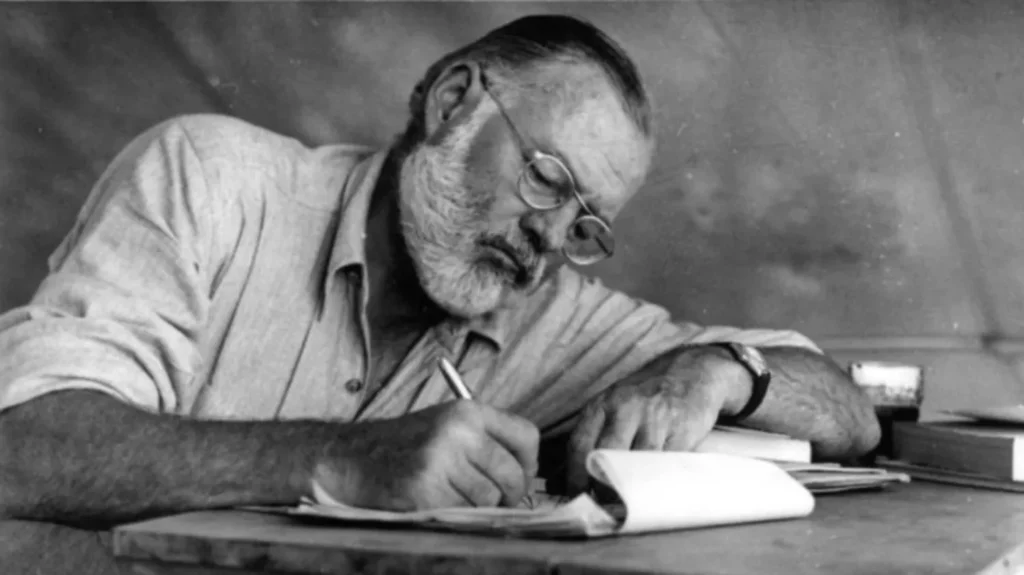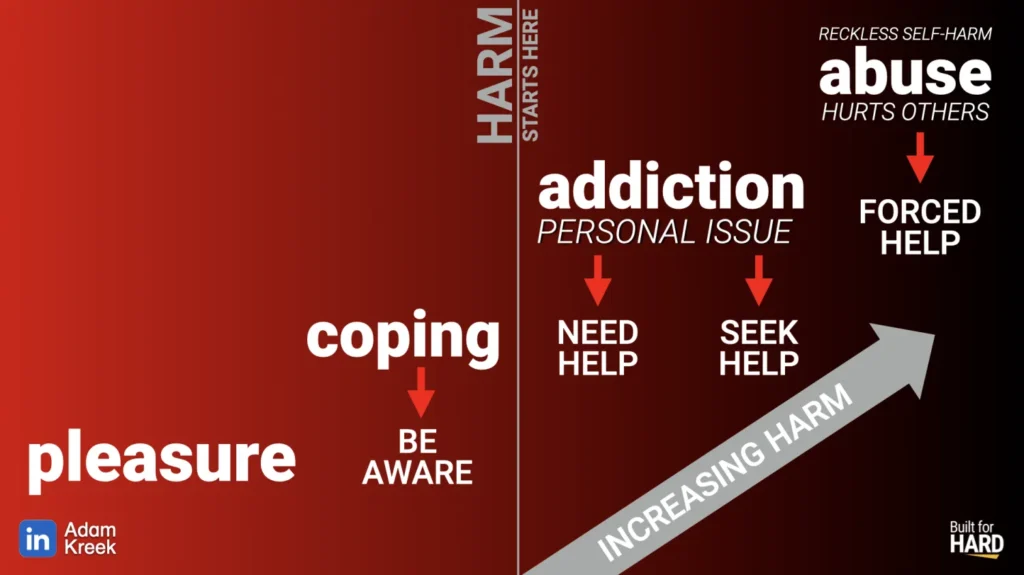
"Write hard and clear about what hurts."
Ernest Hemmingway
American Author
- Date
Procrastination Journaling: Turn Distraction into Achievement
posted in Built For Hard

Adam Kreek
Are you procrastinating right now?
You might be reading this blog instead of sending that one email you don’t want to write. Or maybe you’re scrolling for motivation while your to-do list grows louder in the background. That’s the problem with procrastination: we usually turn to consumption instead of creation.
We doomscroll, we binge-watch, we snack on other people’s content while our own work sits untouched.
There’s a better way. It’s called procrastination journaling.
Why Journaling Works (and Why You Haven’t Found the Right One Yet)
People tell me all the time: “I don’t like journaling.”
That’s like saying “I don’t like exercise.”
Sure, maybe you hate running. But have you tried rowing? Or salsa dancing? Or Zumba? Same thing with journaling. There are dozens of styles: gratitude journals, the Five-Minute Journal, Morning Pages, productivity planners. Some are forward-looking, some are reflective. The key is finding the right fit.
The style I want to share today is built for people like you and me—people who hit the wall of procrastination and default to distraction.
The Method: Procrastination Journaling
Here’s how it works:
- The next time you feel the urge to procrastinate—don’t open TikTok, don’t refresh your inbox, don’t scroll LinkedIn.
- Instead, grab a notebook and a pen.
- Write whatever’s on your mind. No judgment. No audience. No filters.
The point is not to share your words. It’s not for social media. It’s not for your boss, your spouse, or your coach. It’s for you. Offline. Private. A way to capture the thoughts that otherwise fuel distraction.
Why It Works: Three Big Benefits
I’ve used this with clients and in my own life, and here’s what always comes back:
1. It moves you from consumption to creation.
As humans, we’re wired to create. When we don’t, we drift into quiet desperation—scrolling endlessly, feeling listless. Journaling scratches that itch to make something, even if it’s just scribbles on a page.
2. It helps you manage your thoughts.
Your brain runs faster than your hand. To write, you have to pick a thought. That means you’re constantly prioritizing—choosing what matters, letting go of what doesn’t. And don’t worry: if a thought really matters, it will come back.
3. It gives language to your emotions.
Therapists have a saying: “Name it to tame it.” Journaling helps you turn blurry feelings into words. When you see them on paper, they lose their edge. You can process, decide, and move forward.
When we procrastinate with consumption, we often numb emotions instead of facing them. In The Responsibility Ethic, I describe this cycle as pleasure → coping → addiction → abuse. It starts innocently—scrolling a feed, grabbing a snack, binging a show.
That little hit of pleasure helps us cope with stress. But repeat it often enough, and it becomes addiction: the brain learns that stress means we must consume. Left unchecked, it grows into abuse, when consumption erodes relationships, damages health, and pulls us away from what we truly value. Procrastination journaling breaks this cycle. Instead of medicating with distraction, we meet the emotion head-on. Pen and paper become the place where stress transforms into clarity, not into another lost hour of scrolling.

My Own Experience
After back-to-back Zoom calls, I’ll sometimes find myself fried. The temptation is to open YouTube, zone out, and burn an hour. Instead, I journal. I unload the conversations, the stress, the tension. Ten minutes later, I feel lighter, clearer, and ready to get back to meaningful work.
Sometimes, journaling reveals the real reason I’m stuck. That’s when I can take action: talk to a friend, call my coach, ask my spouse for perspective. But I wouldn’t have found that clarity without putting pen to paper first.
And clients tell me the same thing: motivation returns faster when they procrastinate with journaling instead of consumption.
Taylor, the CMO: From Anger to Awareness
Taylor, a Chief Marketing Officer I coached, carried a lot of deep-seated anger. He didn’t always notice it, but his team did. Instead of exploding or bottling it up, I encouraged him to try procrastination journaling.
At first, he scribbled furiously in his notebook—venting about colleagues, stressors, and deadlines. Over time, something shifted. The anger softened into awareness. He noticed patterns: his worst flare-ups came after long stretches without food, or when he’d skipped the gym. Journaling helped him connect the dots—his blood sugar, his workload, his need for physical release.
Instead of venting at his team, he found healthier outlets. He joined a Brazilian jiu-jitsu gym. He called trusted friends to blow off steam outside the office. The result? Less stress dumped on his direct reports, and more energy focused on creative strategy. Procrastination journaling didn’t erase his anger—it gave him the tools to process it and channel it productively.
Mark, the CEO: From Telling to Modelling
Then there’s Mark, a CEO who was frustrated that one of his managers just wasn’t “getting it.” He’d tell the manager how to run a meeting, but the advice never stuck. In his procrastination journal, Mark finally wrote out his real frustration: “Why do I keep repeating myself?”
That sentence unlocked something. Through reflection, he realized the problem wasn’t the manager’s listening—it was his teaching style. Instead of telling, he needed to model. So, Mark invited the manager to sit in on his meetings, watch his style, and debrief afterwards.
Within a month, the manager leveled up. He adopted the techniques he’d seen modelled: clear agendas, active facilitation, and balanced participation. For Mark, this was a breakthrough. Procrastination journaling revealed that his role wasn’t to push harder, but to demonstrate the standard he wanted lived out. The shift freed Mark’s time and gave the manager confidence to lead a key aspect of the business.
Values-Driven Achievement
This is about more than productivity. It’s about values-driven achievement.
When you journal, you uncover what truly matters. You surface the values underneath your frustration, distraction, or fatigue. And when you act from values, your achievement feels different. It’s aligned. It’s fulfilling. It’s sustainable.
We’re all Built for Hard™—but only if we have the right practices in place. Procrastination journaling is one of those practices.
Your Turn
The next time you’re tempted to scroll, stop.
Grab a notebook. Write down what you’re feeling.
Don’t judge. Don’t edit. Just write.
And watch how quickly the fog lifts.
When you choose creation over consumption, you don’t just beat procrastination—you reclaim your values, your time, and your achievement.
–––––
Adam Kreek is on a mission to positively impact organizational cultures and leaders who make things happen.
Kreek is an Executive Business Coach who lives in Victoria, BC, near Vancouver, British Columbia, Canada, and Seattle, Washington, USA, in the Pacific Northwest. He works with clients globally, often travelling to California in the San Francisco Bay Area, Atlanta, Georgia, Toronto, Ontario and Montreal, Quebec. He is an Olympic Gold Medalist, a storied adventurer and a father.
He authored the bestselling business book, The Responsibility Ethic: 12 Strategies Exceptional People Use to Do the Work and Make Success Happen.
Discover our thoughts on Values here.
Want to increase your leadership achievement? Learn more about Kreek’s coaching here.
Want to book a keynote that leaves a lasting impact? Learn more about Kreek’s live event service here.